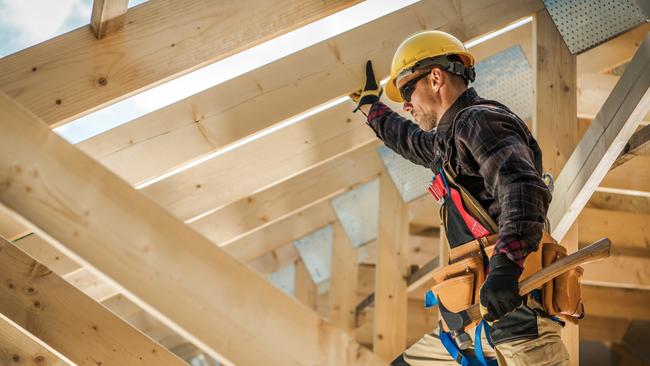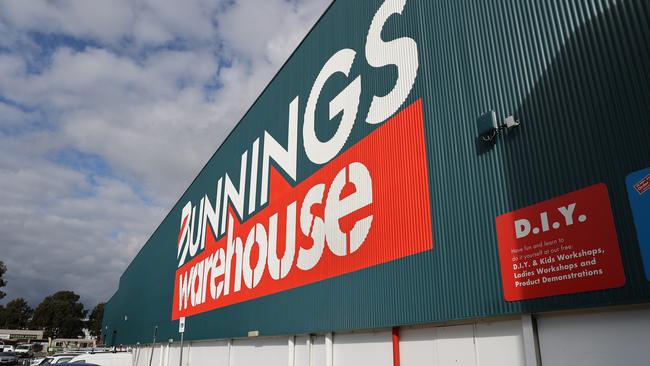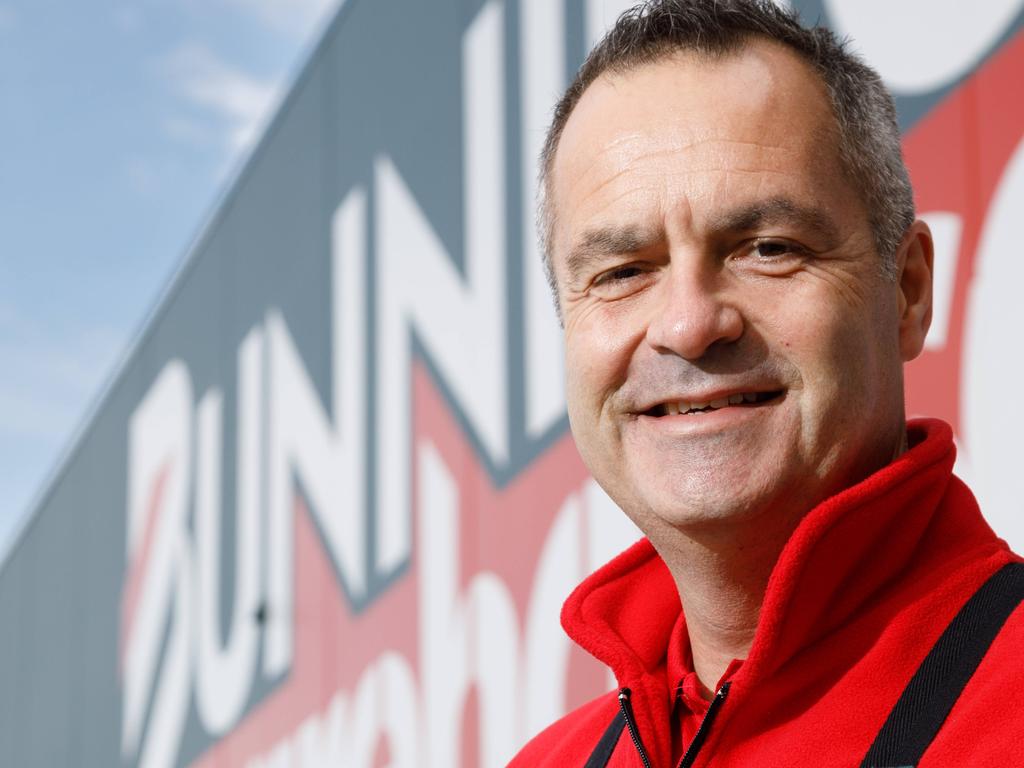Bunnings plans to double processing plants making wooden frames and trusses for home building
Amid national shortages, Bunnings will double its processing plants that manufacture wooden frames and trusses used in home construction.

Business
Don't miss out on the headlines from Business. Followed categories will be added to My News.
Bunnings will over the next 18 months seek to double the number of processing plants it owns that manufacture wooden frames and trusses used in home construction, substantially growing its market share in a high-growth category that struggled with shortages through Covid-19.
A stronger and more national footprint of Bunnings manufacturing hubs will also bind it more closely to home builders who typically have a long shopping list of items they need to buy and could help lift sales across the group.
Currently hardware giant Bunnings operates three frame and truss sites in Australia – at Warnervale and Unanderra in NSW and Hallam in Victoria.
Building industry insiders say Bunnings is searching for a site for a new frame and truss facility in Melbourne, another in Brisbane and potentially more in NSW.
Frames and trusses have been in short supply during the pandemic as rocketing timber prices and supply chain disruptions strangled the pipeline of the core building materials that form the internal structure of new homes.
Bunnings aims to set itself up as a major, growing supplier of frames and trusses to home builders, binding more closely to home constructors and making it more likely they will pick up other materials used to build a house when they use Bunnings to supply frames and trusses.
The thinking behind the Bunnings pitch for the frame and trusses category is that while builders pick up their home frames and trusses from a Bunnings site, and use their Bunnings trade account, they will be more amenable to also buying other building materials that go to constructing their homes, such as fibre cement, doors, plaster, tiles and other building materials.
Bunnings, part of the Wesfarmers conglomerate, is expected to sketch out more of its growth aspirations for the frames and truss business at the Perth-based company’s strategy day in June, but it has been busy scoping out land and exploring other aspects of the plan to establish as many as three new manufacturing sites.
The customer for Bunnings’ burgeoning frames and trusses business will predominantly be a residential builder that has steady volumes of work in the medium-density residential market, typically less than three storeys.
It could also be attractive to owner-builders.
Frame and truss is the most common method used for the construction of freestanding dwellings, generally up to three storeys.

The use of prefabricated frames and trusses, to be pumped out by the growing network of Bunnings plants, will dramatically speed up the process on site, as the wall panels and trusses are simply erected as opposed to being constructed cut and nailed) on site.
Frames and trusses can be constructed with timber or steel, with timber the predominant material used across Australia.
The expansion plans come at a time when many within the building industry are growing increasingly concerned about a fresh wave of building material shortages, especially timber used for building frames.
Russia and the Ukraine are typically responsible for as much as 15 per cent of global timber, and the war raging between the two nations could disrupt supplies and put a rocket under prices.
Bunnings has operated frame and truss plants in Australia for over 20 years.
The operations have been a “quiet achiever” for the hardware group, which now views the building materials category as one with growth opportunities.
Ben McIntosh, Bunnings chief operating officer, commercial, told The Australian that rolling out more frame and truss plants would help the hardware retailer service more builders as they planned and executed home building projects.
“We are excited to be expanding our participation in this market, improving our offer and working with even more customers to provide solutions for their projects, end to end,” Mr McIntosh said.
“The expansion plans form part of our wider commercial strategy as we continue to be a trusted partner to builders, from the moment they are planning a build, right through to the fitout.”
Bunnings’ existing network of three frame and truss plants supplies high-quality materials in the prefabrication of roof trusses, floor trusses and wall frames, servicing a mix of volume, project and small to medium enterprise home builders.
The frame and truss team also provide service and advice, including quoting, estimating and detailing for both small and large scale projects.
Bunnings will roll out its new plants, as many as three more, over the next 12 to 18 months, creating a number of new manufacturing jobs.
It also gives Bunnings deeper and more secure access to core building materials at a time when global supply chains are facing bottlenecks and major delays caused by the Covid-19 pandemic and the war in Europe.
The Australian construction industry, which generates around $360bn in revenue per year, with residential construction contributing 5 per cent to the national GDP, was left highly exposed to key building material shortages during the Covid-19 pandemic – namely wooden frames and trusses.
The lack of timber and soaring timber prices since early 2020 squeezed builders even more as they were not only forced to wait longer for frames and trusses to be delivered to their worksites, which dragged out construction times, but also were facing higher costs when the material finally arrived.
The lack of available timber, used for frames and other key parts of residential housing construction, was partly driven by government incentives for new house builds that drove a surge in activity, as well as depleted supplies caused by bushfires and supply chain disruptions flowing from the pandemic.
Although supply bottlenecks have improved somewhat in the last few months, many parts of Australia are still in desperate need of timely frames and trusses with some parts of regional Australia waiting as long as four months for frames and nine months for trusses.
Over the last few years Bunnings has broadened its range of hardware and building material operations.
In 2019 it announced the acquisition of the Adelaide Tools chain, with plans to roll out as many as 75 stores across Australia and New Zealand, and last year it bought retailer Beaumont Tiles, which has 115 stores.
Originally published as Bunnings plans to double processing plants making wooden frames and trusses for home building





